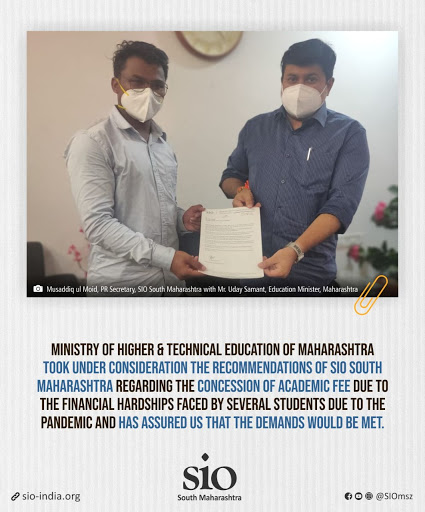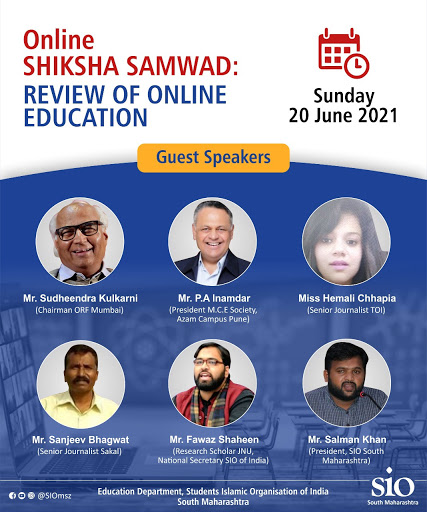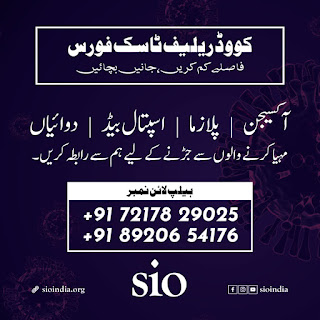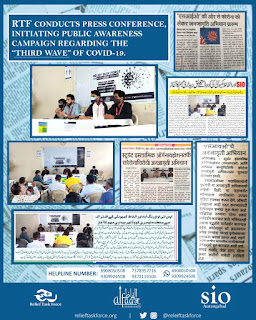Budget Recommendations 2021-22
Today we are going through circumstances like never before due to the
pandemic, where in common man has been pushed into an unprecedented crisis.
As a country with highest youth population we are facing the daunting task of
reviving and giving a new ray of hope in these testing times. In this post-covid era
both government and non-government entities of the society have a peculiar
challenge in trying to solve the problems faced by students and youths. In the
view of the upcoming budget of the state of Maharashtra we would like to
suggest a few important interventions that could be considered during the
framing of the state budget.
By providing these recommendations SIO demands that the state government
must allocate up to 20% of budget expenditure to the field of education. In the
2020-21 budget comparatively to previous budgets there was an appreciable 9%
increment in allocating funds to the education sector but considering the
circumstances and challenges we are facing right now, which needs innovative
and new strategies in the field of education, the state government must make this
a pro-education budget by allocating more funds in the upcoming budget.
Primary Education:
Considering the ineffectiveness and inability in implementation of Right
To Education (RTE) Act, State government must ensure the proper
implementation of RTE, by constituting a standing joint-party committee
(JPC) to address various issues, to oversee and monitor effective
implementation of RTE Act(2009), including accountability of its funds
and finances.
The National Education Policy (NEP) 2020 gives special importance to
Early Childhood Care and Education (ECCE). State government must
Integrate Anganwadis to Primary school. There is a vast network of
Anganwadis across the state including rural and urban areas, which
aren’t effectively regulated and hence falter on various parameters.
Bringing them under the ambit of primary education will ensure quality
ECCE.
State government must make Pre-primary education free in the state as
this will help in addressing the problem of inequity existing in society
and allow for the holistic development of a child in early childhood.
As suggested by Finance Minister in 2020-21 budget, to Develop at least
four schools as model schools in every Taluka. The state must make
quick action plan for its implementation across state as there is no
significant progress in this regard.
The disruptions caused to educational sector by recent Pandemic has
highlighted the need for strengthening digital infrastructure in the
schools. Additional budget needs to be sanctioned for digital education
and setting up of digital infrastructure in schools.
State must provide nutritional support for children in Nagar Palika
schools, as 2020-21 budget only provided for Zilla Parishad schools.
State government must set up an expert committee to tackle the
menace of fee hike and must keep a check on increasing tendencies of
privatization of education so as to ensure accessibility of education for
the poorer section of society.
To facilitate safety travel access to educational institutions across
Mumbai city, free transportation facility should be provided to students
of all levels in the form of special train/buses.
The concept of a school for every village has to be introduced in rural
areas in the state. Also state must facilitate free transportation for
students of these rural areas. This will facilitate their movement and
increase access to education.
State must increase the overall budget allocation for government
schools.
Higher Education:
Issues related to the scholarships/fellowships/grants/schemes offered by
under various schemes by the union and state governments have to be
addressed. In this era of rocket inflation, the government should at the very
least double the current amount given under these various schemes and
must ensure timely disposal of the same.
The financial assistance to secure Higher Education should not become a
burden on the new and aspiring graduates, hindering progress of their
careers and life by imposing a heavy premium on it. Hence the union and
state government should waive all outstanding education loans as well as
convert all educational loans to educational grants or scholarships in future.
As Chief Minister rightly said there will be expectation from all regions of
society regarding the budget of government, the state must allocate land
and funding for the long standing demand of Aligarh Muslim University Off-
Campus at Khuldabad area of Aurangabad.
Also State must rapidly follow up on the process of setting up of separate
university for Konkan region. It’s a long pending demand of people from the
Konkan that there should be a separate university in the Konkan region.
State authorities must set up mental health centres/ counselling centres at
Government and private premier institutes. Based on the findings of a
survey in a premier institute, the proportion of the students currently
suffering from a mental disorder is the most crucial and requires active
intervention. More so is the need in the current scenario to highlight the
support systems in the institute.
Employment:
Speedy implementation of Chief Minister's Employment Generation
Scheme which aims to create one lakh industrial units and generate
employment.
Skill development and vocational training centres should be set up on a
mass scale in an effective, transparent and accessible manner so that their
benefits can be availed by those most in need of them. Also State must
strengthen these vocational training Institutes and link them to industries
assuring the placement of students.
Create Taluka – level job creation centres that employ local people to
identify employment opportunities and to systematically to promote
employment.
1. Maulana Azad अल्पसख्ं याक आयोग Maharashtra not issuing loan based
scholarship. The amount is be lapsed and it will be around 300cr.
2. No amount disbursed for the already sanction amount of madrasa
modernization scheme of central govt.
3. 5% reservation of Muslims not implemented in state so far.
4. Minority schools are not getting grants as specified by the previous budget
commission.
5. Pending minority girls hostels in six places in Maharashtra.
6. Pending construction of Urdu ghar.
7. Disbursement of sanctioned state government scholarship from ministry of
minority affairs
8. Separately Ministry of wakf should be form for the protection of wakf
property from illegal occupation.
9. Implementation of Sacchar committee 15 points agenda for Muslim minority
10. Implementation of Mehmudur Rehman committee report prepared to
review the status of Muslims in economy and other social aspects
11. Social audit to be made mandatory for all welfare schemes



